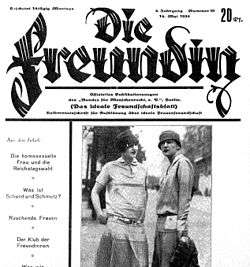Friedrich Radszuweit
Friedrich Radszuweit (born 15 April 1876- 15 March 1932) was a German manager, publisher, and author.
Early life and career

Radszuweit was born in Königsberg. He moved to Berlin in 1901 and opened a shop for women's clothes. In 1923, Radszuweit, who was gay,[1] founded the organisation Bund für Menschenrecht E.V. (BfM), which worked for the rights of gay people and for the deletion of Paragraph 175. He started his own publishing company and published the monthly magazine Zeitschrift für Menschenrecht from 1923 to 1933. The company also published several LGBT books and homoerotic graphics.
The company also produced the first gramophone record with homosexual themes, including Bubi laß uns Freunde sein by Bruno Balz and Erwin Neuber. Other magazines published include Insel, Magazin der Einsamen (1926–1931), and Das dritte Geschlecht (four editions: 1930/1931). He also started the lesbian magazine Die Freundin, Wochenschrift für ideale Frauenfreundschaft.
Radszuweit wrote the novels Männer zu verkaufen, Ledige Frauen, Die Symphonie des Eros and Paul Tritzkis Lebensweg. In 1927, he produced a flyer for the members of the Reichstag advocating reform of § 175.[2]
Death
In April 1932, Radszuweit died in Berlin of a heart attack. His businesses were taken over at his death by his lover Martin Butzkow (1900-1933), whom he had adopted to allow him to be his heir.[3]
Works
- Männer zu verkaufen, Leipzig, Lipsia-Verlag, 1932, 6. edition
- Ledige Frauen, Berlin, 1928–1929
- Die Symphonie des Eros, Berlin-Pankow, Kaiser Friedrich-Str. 1, 1925
- Paul Titzkis Lebensweg, Berlin-Pankow, Kaiser-Friedrich-Str. 1, Orplid-publishing, 1924
Further reading
- Bernd-Ulrich Hergemöller, Mann für Mann, Hamburg
- John Lauritsen and David Thorstad, The Early Homosexual Rights Movement 1864-1935 (Times Change Press, 1974).
Notes
- ↑ Steakley, James D. (1975), The Homosexual Emancipation Movement in Germany, Arno Press, ISBN 0-405-07366-6
- ↑ Radszuweit, Friedrich. Irrlehren über die Homosexualität. § 175 muss abgeschafft werden ! Denkschrift an den Deutschen Reichstag zur Beseitigung einer Kulturschande, published by Bund für Menschenrechte, Berlin 1927, 14 pages
- ↑ Whisnant, Clayton J. (2016). Queer Identities and Politics in Germany: A History, 1880 1945. Columbia University Press. Retrieved 24 June 2018.